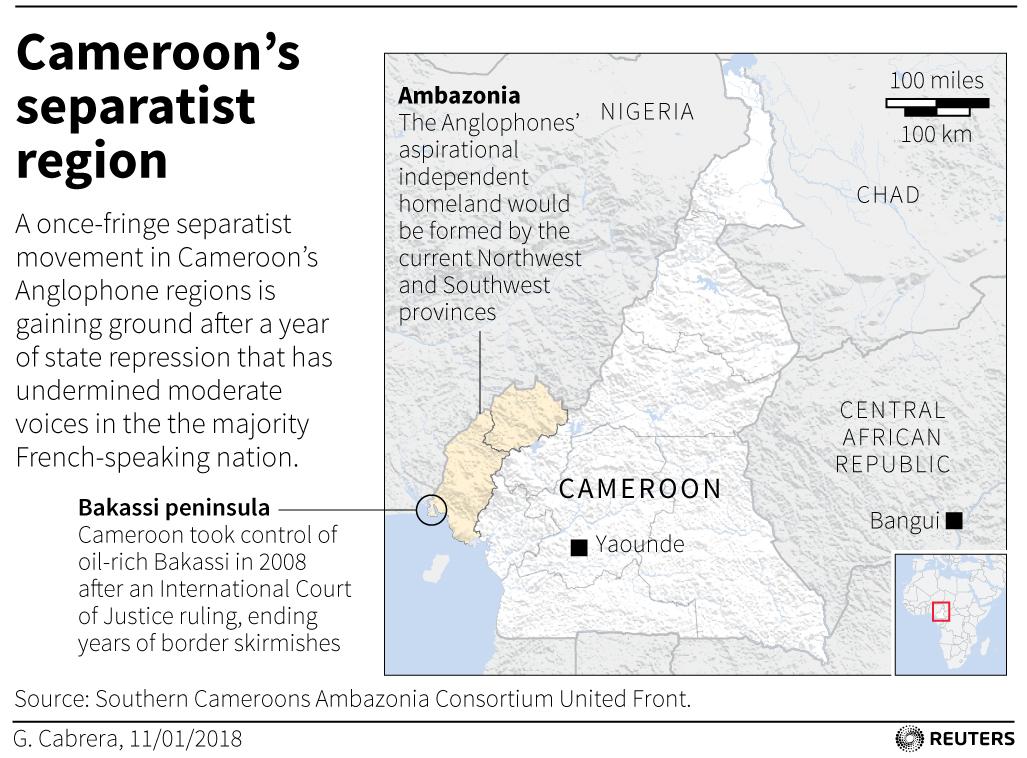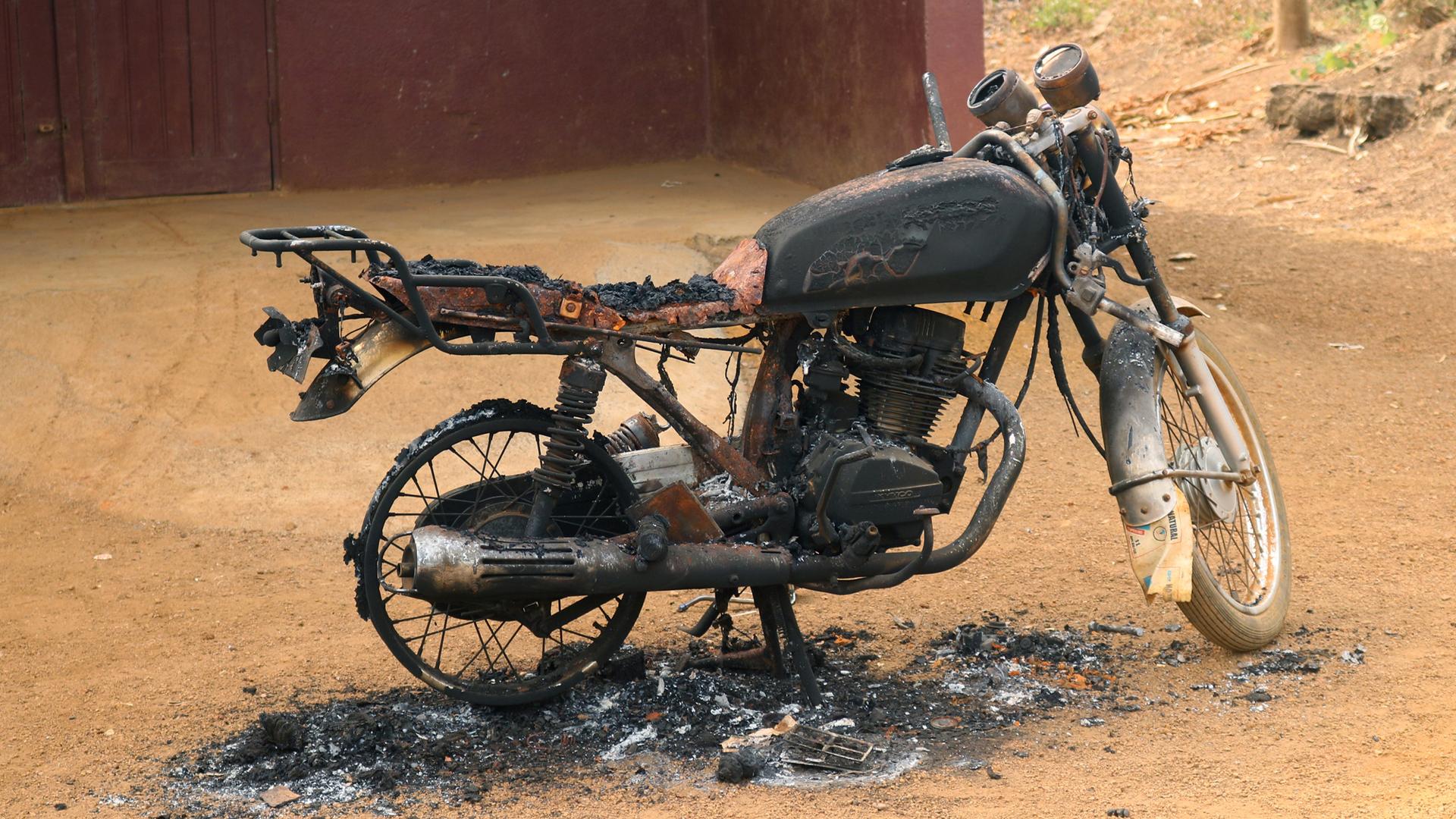A burned and destroyed motorcycle is seen in Kembong, south-west region of Cameroon Dec. 29, 2017.
Daniel was in his home in the village of Bole in Southwest Cameroon on Feb. 2 when he heard gunfire and a commotion. Moments later, his house was ablaze, flames licking the walls.
Despite the fire, Daniel dared not leave. Outside, dozens of Cameroonian soldiers charged with putting down a separatist insurgency had descended from trucks, opened fire on fleeing residents and set buildings alight, he said. Daniel's brother Ekoda, who was outside the house, said he saw seven dead bodies.
Army spokesman Col. Didier Badjeck said claims that houses were burned and people shot in Bole last week were "totally false," and he denied that soldiers were mistreating residents in other villages detailed in this story.
"We are sure that the soldiers are respecting human rights. If we don't do that we are very foolish," Badjeck told Reuters by telephone, adding that any misconduct by soldiers is dealt with strongly. "If you want success, you have to have the population on side."
A government spokesman did not respond to requests for comment.
The Bole raid, corroborated by other witnesses, echoes near identical operations by the army in villages across Southwest Cameroon.
The accounts shed new light on the fast deteriorating security situation in Anglophone Cameroon and on the tactics used by the military to quell a growing secessionist movement that has killed 22 soldiers and policemen in a campaign to split Cameroon's English-speaking minority from Yaounde.
The fighting has become a threat to President Paul Biya's longstanding rule and to stability in the oil- and cocoa-producing Central African country where presidential elections are scheduled for October.
There are about five million Anglophones in Cameroon, a nation of 24 million. Most of Cameroon's oil is found off the coast of the Anglophone region, according to the International Crisis Group.
Interviews with a dozen residents and separatist leaders in the English-speaking Southwest and Northwest regions reveal another worrying trend for Biya: The crackdown is increasing support for a growing number of armed groups bent on secession.

"They are fighting against us because they don't want us to separate from them, but we have already made up our minds," said Daniel, who spoke from his bed in a nearby hospital, medical gauze covering his left arm, his face charred. Daniel escaped the burning house when the soldiers left, but not before suffering severe burns.
Daniel, like most residents quoted in this story, asked that his full name not be used for fear of reprisals.
Attacking wholesale
There have been secessionists ever since Anglophone Cameroon gained independence from Britain in 1961 and voted to join in a federation with neighboring Francophone Cameroon, which had won independence from France a year earlier.
French-speaking politicians held sway in government and the promise of equality for Anglophones faded. They were forced to drive on the right hand side of the road, adopt the metric system and take on the CFA franc currency.
In 1972 President Ahmadou Ahidjo declared an end to federalism, erasing regional autonomy completely. His successor, Paul Biya, centralized things further when he came to power in 1982. He removed the second star from the national flag which represented the Anglophone regions.
The separatist movement remained on the political fringe for decades until late 2016, when English-speaking lawyers and teachers protested peacefully against having to work in French.
The government cracked down hard and civilians were killed in clashes with police. The crowds grew in response, and so did the violence. In October 2017, more than 20 were killed during marches, according to Amnesty international. The military fired live rounds on protesters from helicopter gunships.
By mid-2017, many who had previously wanted just a return to federalism were calling for secession. At marches, protesters waved the blue and white flag of Ambazonia — the separatists' proposed new state. An armed group called the Ambazonian Defense Force began attacking government soldiers in Anglophone regions.
"In 2016, people were calling for non-violence, and it was the same for most of 2017. But in 2018, people no longer see that rhetoric as holding water. They have to defend themselves," said Tapang Ivo Tanku, an Anglophone activist based in the United States.
The formal secessionist leadership, known as the Government of Ambazonia, has distanced itself from attacks on soldiers. Its leader, Ayuk Tabe, was arrested last month in Nigeria and was deported to Yaounde. It was a symbolic blow to the movement, and Nigeria's cooperation with Younde worries some separatists.
But even supporters say the Ambazonian government risks irrelevance as the separatist movement takes on a life of its own.
The ADF has been joined by newer armed groups made up mostly of young men. The Vipers has claimed responsibility for burning government buildings. The Manyu Tigers says its ranks are growing and it has carried out attacks on military checkpoints.
"There are hundreds of us, but we are aiming for 2,000-3,000. We want to start attacking wholesale," said the group's financial director, Ambe Simon, in a telephone interview. "We are receiving money from all over the world. We have $50,000 at the moment. We are getting weapons from the black market."
'In a war'
Faced with this threat, the Cameroonian military in December fanned out into the villages among the cocoa farms and forests near the Nigerian border that have become the separatists' stronghold.
More than 40,000 have since fled to Nigeria, according to the United Nations, and most villages are deserted. Communications are slow in the rural areas and the internet is frequently shut off, but interviews with residents reveal what they were fleeing from.
Residents of Kembong in southwest Cameroon call Dec. 18 "the day of misfortune," when troops in search of rebels came to the town. An 81-year-old man, James Oben Ndi, had to flee after his house was burned down.
"All my effects were in that house. There was my daughter's sewing machine, her clothes. Our whole life was in that house," he told Reuters during an interview in a church in a nearby town where he has sought shelter.
On Jan. 14, soldiers entered the village of KwaKwa, a few miles from Bole, looking for information about a soldier killed there. Villagers fled to nearby cocoa farms as the soldiers opened fire.
A resident named Alex returned under cover of darkness the following evening to assess the damage: Most of KwaKwa's wooden houses were burned to ash and dead bodies lay in the street.
He helped bury more than 10 bodies behind a burned-out house. His account was corroborated by two other residents.
"Everybody was running in all directions," Alex said in a telephone interview. "Things are not going well. We are in a war."
By Edward McAllister/Reuters
Reporting by Central African staff; editing by Giles Elgood.
